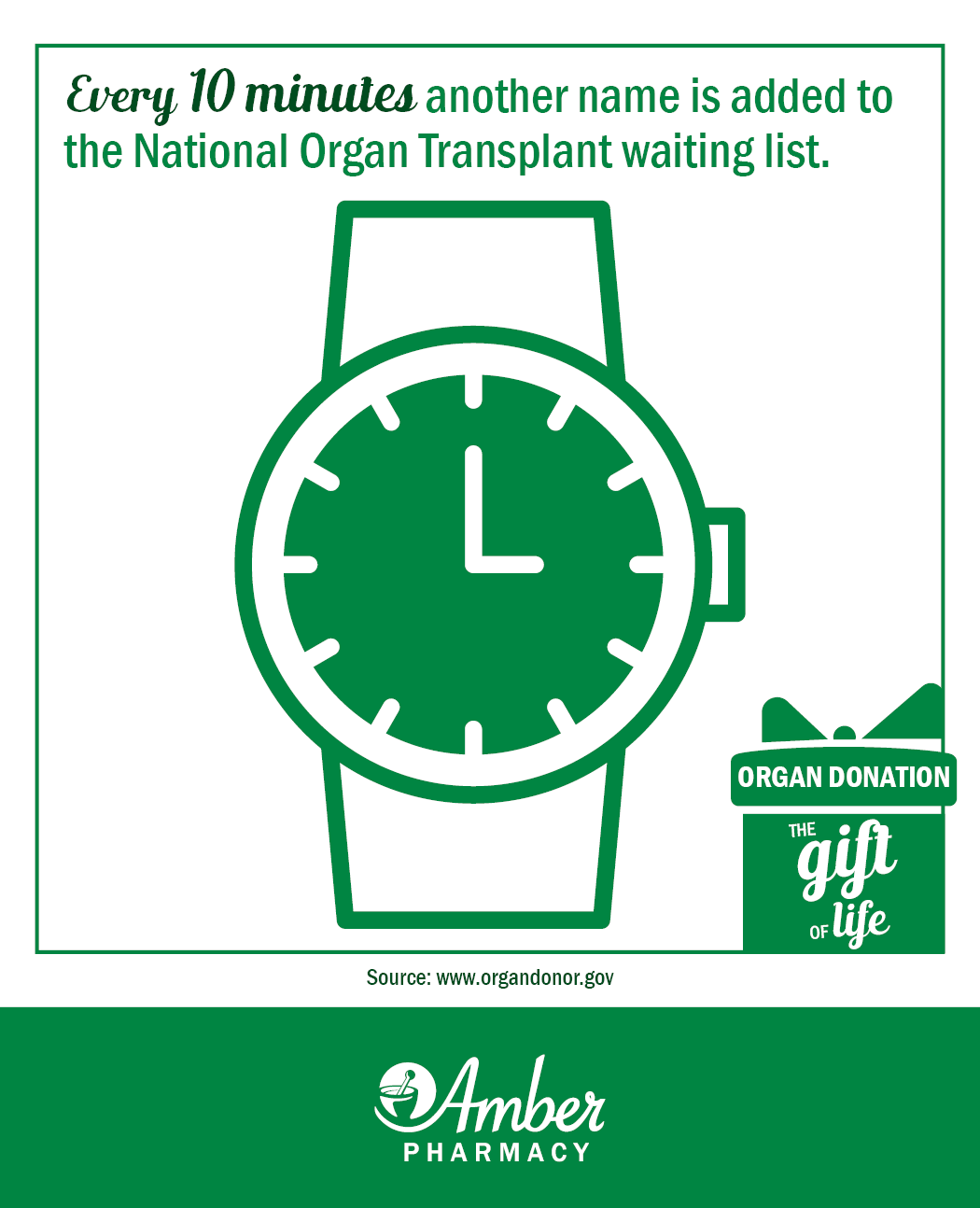Important Updates To Medicare: A Message To Pat...
Blog
Understanding Specialty Pharmacy’s Role in Transplant Patient Care
- April 24, 2018
- Amber Specialty Pharmacy
- Transplant

April is National Donate Life Month. To celebrate, through a series of blog posts we are putting a spotlight on the important role specialty pharmacies play in caring for transplant patients and taking a look back at our 20-year history of supporting the transplant community.
National Donate Life Month is a time to raise awareness about the importance of organ donation, encourage people to become organ donors, and to recognize donors, recipients and their support teams.
When people think of organ donation, they typically think of kidneys, hearts and other major organs. However, organ and tissue donations also include the lungs, pancreas, liver, corneas, skin, tendons, bone, nerve and heart valves. One person can save eight lives with their donation. The most common transplant operation is a kidney transplant consisting of 57.1% of total transplant operations in 2017. UNOS reports liver transplants and heart transplants as the second and third most common procedures.
Specialty pharmacy for transplant patients
Specialty pharmacy plays a critical role in the transplant process. Once the patient receives a new organ, a team of nurses, doctors and pharmacists will work together to get the correct dose of medications. Transplant patients will take what are referred to as narrow therapeutic index (NTI) drugs, which means they have a small window of error when it comes to determining how much medication a patient needs.
In the days and weeks following a transplant, it’s not unusual to have several dose changes for a medication. Pharmacists, doctors and patients have to communicate these changes with each other. For Rusty Helser, lead transplant pharmacist at Amber Specialty Pharmacy, talking to patients is the highlight of his day. “It’s always fun talking to new transplant patients because they have a new lease on life,” says Rusty. “It’s like their life is back. They’re always positive and upbeat. It’s a real pleasure talking to them on the phone.”
When a patient’s care is carefully coordinated, the recovery process becomes much easier for everyone. Transplant recipients often develop a close relationship with their pharmacist. The pharmacist will monitor medications, help manage side effects, send refill reminders, and provide educational resources.
Patient education and adherence
Patient education is an important part of specialty pharmacy, especially for a pharmacy’s transplant patients. Transplant recipients are often on certain medications for the rest of their lives. It’s crucial that they understand what the drugs are doing and how they could interact with other medications. Pharmacists are able to walk patients and caregivers through their prescriptions and answer any questions.
Studies have found that better patient understanding leads to better adherence. Adherence is when a patient takes the right dose of the right drug for the right amount of time. Basically, they’re following the medication’s guidelines. Adherence is especially important for transplant patients when it comes to immunosuppressant drugs. Immunosuppressant drugs keep a transplant’s immune system from attacking the new organ. If a patient stops taking their immunosuppressant medication or takes an incorrect dose, there could be serious complications.
Take action
Every 10 minutes someone is added to the organ transplant wait list, which has over 116,000 people who are waiting for a life-changing donation.* Studies show that 95% of adults support organ donation. While their support is exciting, only 54% of U.S. adults are actually registered organ donors, according to the United Network for Organ Sharing (UNOS). For more information about how to sign up to become an organ and tissue donor, visit registerme.org.
Amber Specialty Pharmacy was proud to sponsor the 2018 5K & Heroes Walk presented by Nebraska Organ Recovery. Together we celebrated the community of donor families, transplant recipients, living donors and other supporters.
For more information about this impactful organization, visit the Nebraska Organ Recovery website at http://www.nedonation.org/.
*Organ Donation Statistics from organdonor.gov and UNOS.org
About the author
Peggy Tomes began working at Amber Specialty Pharmacy in 1998. Since then, she’s proven to be an invaluable member of our team, serving in many different roles, and is currently senior vice president, billing & reimbursement. Peggy enjoys following legislature and is involved on committees that monitor industry government affairs. As a grandma, Peggy loves spending time with her five grandchildren, especially at the baseball stadium. Peggy and her family are avid Kansas City Royals baseball fans.



